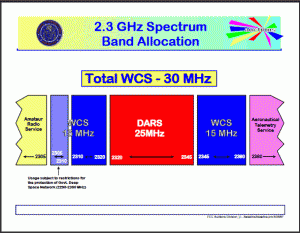 If you were hoping that the longstanding feud between Sirius XM and holders of wireless spectrum in the 2.3 MHz band was over, well, it appears that it isn’t. Sirius XM (SIRI) has filed a Petition for Partial Reconsideration with the Federal Communications Commission, asking the agency to rethink its new rules for the two services.
If you were hoping that the longstanding feud between Sirius XM and holders of wireless spectrum in the 2.3 MHz band was over, well, it appears that it isn’t. Sirius XM (SIRI) has filed a Petition for Partial Reconsideration with the Federal Communications Commission, asking the agency to rethink its new rules for the two services.
The Order “reversed long-standing protections that the Commission found necessary to prevent interference to satellite radio consumers by allowing, for the first time, mobile operations in the 2.3 GHz Wireless Communications Service,” Sirius insists. “The FCC must revise its new rules in order to adequately protect satellite radio’s nearly 35 million existing listeners.”
As we reported back in May, the Commission set up permanent non-interference regulations for Sirius’s terrestrial repeaters and power level limits for Wireless Communications Services band mobile and portable stations. This unleashed 25 MHz in the WCS zone for wireless broadband. The Order also put the WCS license holders on a service schedule:
“For mobile and point-to-multipoint services, WCS licensees must serve 40 percent of a license area’s population within 42 months, and 75 percent within 72 months. For fixed point-to-point services, WCS licensees must construct and operate 15 point-to-point links per million persons in a license area within 42 months, and 30 links within 72 months, together with a minimum payload capacity to ensure that the spectrum is used intensively. Licensees will not be required to satisfy submarket construction requirements.”
But Sirius XM, which has long opposed these new guidelines, insists that they’re based on faulty data.
“In setting OOBE [out of band emissions] limits for WCS transmitters,” the company warns, “the FCC ignored, discounted, or misconstrued technical data submitted by Sirius XM demonstrating a high potential for interference even when the victim receiver and the interfering transmitter are separated by significant distances. At minimum, the Commission should have adopted more stringent OOBE limits for mobile and portable WCS devices to minimize the potential and extent of interference.”
The Sirius XM filing asks for new maximum transmitter power limits and bigger guard bands between WCS transmitters and Sirius XM receivers. “The Commission has adopted technical and operational service rules that elevate the WCS licensees’ commercial convenience above the rights of satellite radio consumers to enjoy interference-free service,” Sirius charges.


